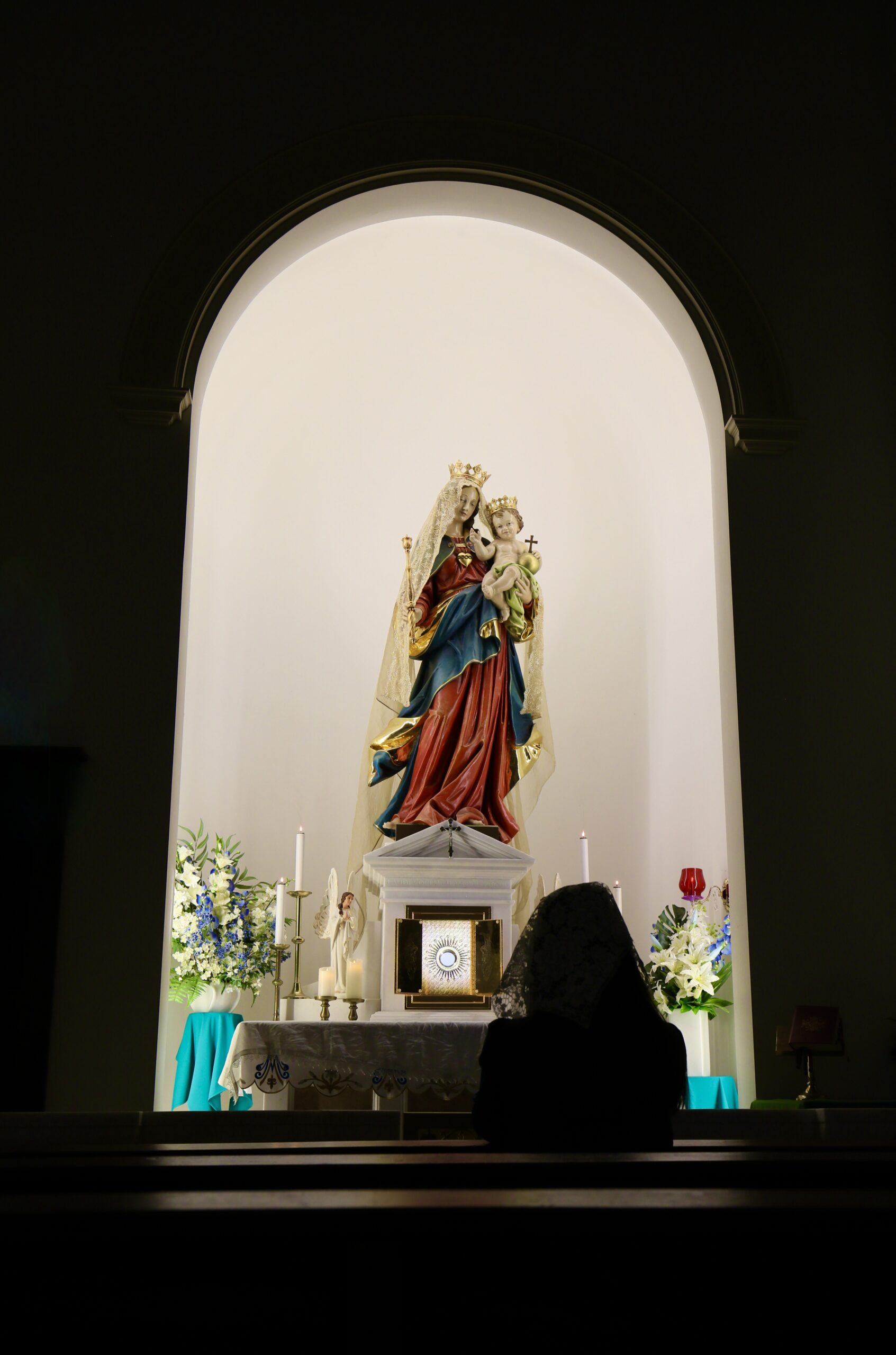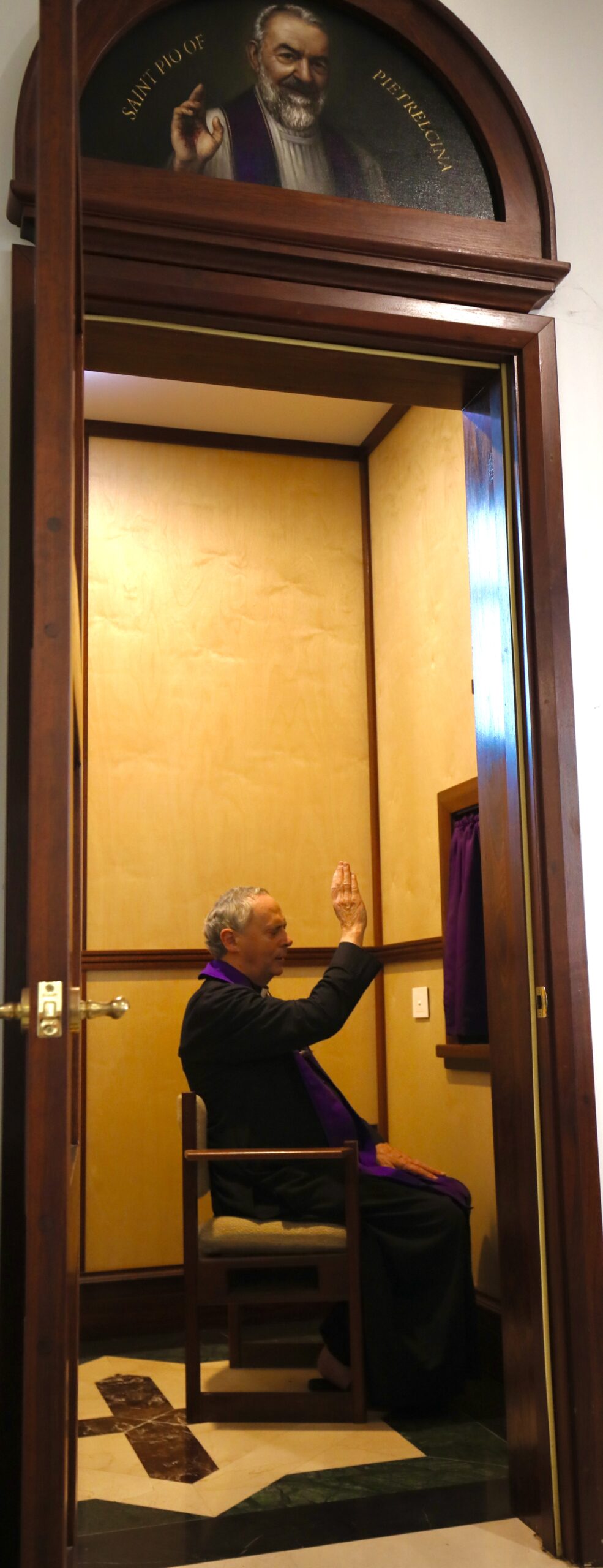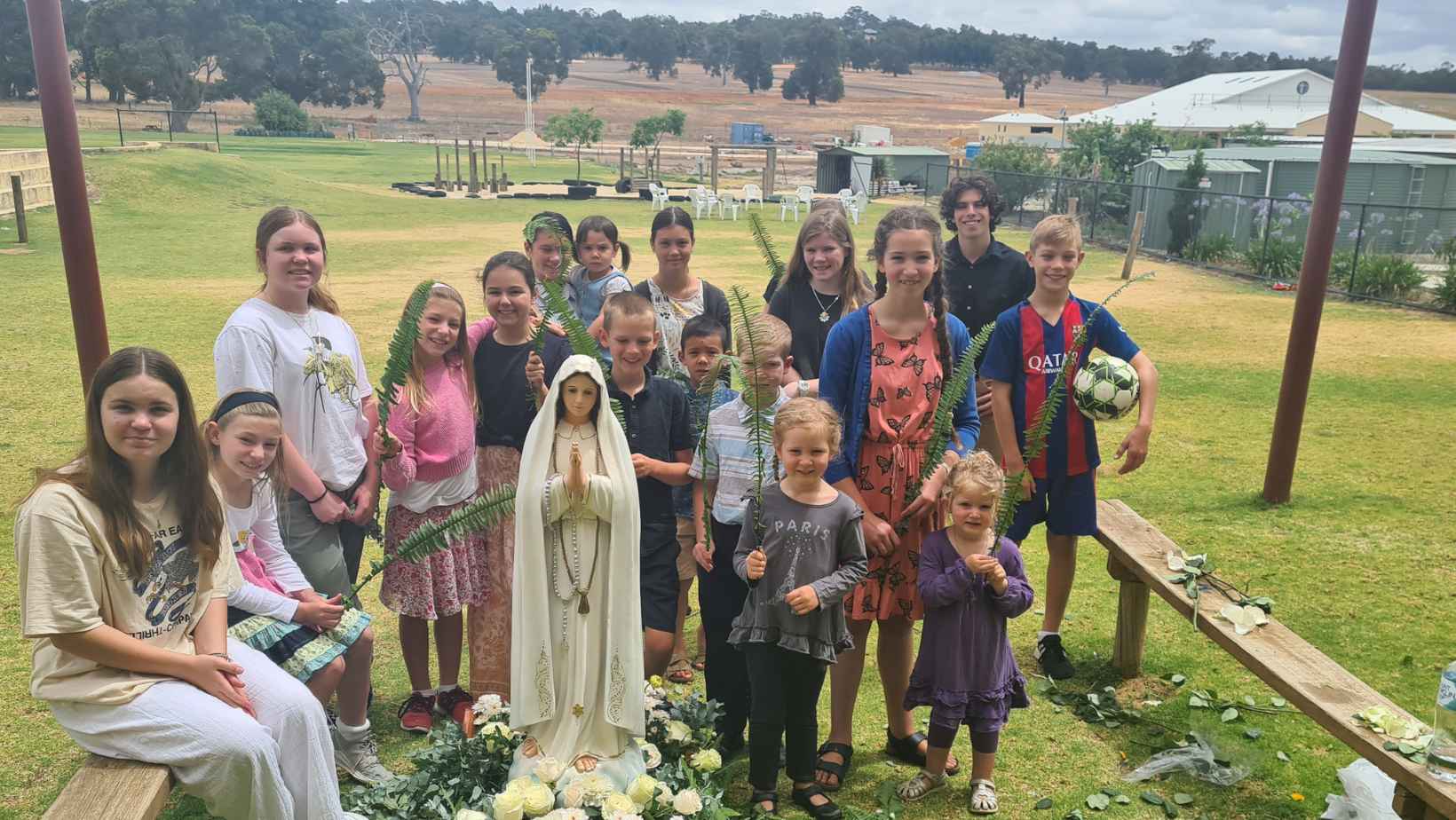Mass Times
Mass, Adoration and Devotions Times
Attend Mass
Holy Mass
The Mass is the fundamental liturgical ritual of the Roman Catholic Church. Our lives of faith revolve around it, and it is the main way Catholics worship God as a community.
Mass comes from the Latin word ‘missa,’ meaning ‘mission’ or ‘sending’ because its purpose is to send forth the faithful to bring forth the Good News of Jesus and to be His presence in the world. ‘Eucharist’ means thanksgiving, so it is also a time to give thanks and praise to God. Our spiritual journey is fed, transformed, and healed through participation in the Eucharist. As Jesus did in His life, we are empowered to go forth and minister to others.
Real Presence of the Eucharist
In the Mass the elements of bread and wine are changed through the words of Consecration and Jesus becomes fully present: Body, Blood, Soul and Divinity. It is the same Jesus as born of the Virgin and is now seated at the right hand of the Father in heaven who is contained in the Sacrament.

yWEEKEND MASS TIMES
| Day | Time | Location |
| Saturday Vigil | 5.00 pm (4.30pm Rosary) | St Catherine’s, Gingin |
| Saturday Vigil | 6.45 pm | Divine Mercy Shrine Maryville |
| Sunday |
7.30 am 9.30 am |
St Anne’s, Bindoon Divine Mercy Shrine Maryville |
WEEKDAY MASS TIMES
| Day | Time | Location |
| Monday | 3:00 pm Prayer and 3:30 pm Mass | Divine Mercy Shrine Maryville |
| Tuesday | 7:00 am & 3.30pm | Divine Mercy Shrine Maryville |
| Wednesday |
3:30 pm Mass Adoration 4.30pm and 5:00 pm |
Divine Mercy Shrine Maryville St Anne’s, Bindoon |
| Thursday | 7:00 am & 3:30 pm Mass |
Divine Mercy Shrine Maryville
|
| Friday | 5:30 pm Mass & 7:00 pm Mass on First Fridays. | Divine Mercy Shrine Maryville |
| Saturday | 9:00 am Mass | Divine Mercy Shrine Maryville |
ADORATION
Why Go to
Eucharistic Adoration?
Communion Hosts
If you enter a Catholic church, you will nearly always spot a sanctuary lamp burning near the tabernacle, which is where the communion hosts are reserved after Mass. They are kept in this way for two reasons: first, so that Holy Communion can be taken to the sick and housebound when necessary; and second, so we can continue to worship Christ in the Holy Eucharist.
Jesus Christ remains present here in the communion hosts, in what we call the Blessed Sacrament. This is not just a metaphor or a symbol. He is truly present – Body, Blood, Soul and Divinity – in all His power and glory and majesty. So if a church appears to be empty, we know that we are never alone.
Whenever we approach the tabernacle, even if the Blessed Sacrament is not being exposed, we enter into His hidden but powerful presence; heaven is opened to us; and we can adore Him and share our lives with Him in an intimate and profound way. We can talk to Him heart to heart. The experience is similar to Moses meeting the Lord in the burning bush, or the disciples walking up the mountain with Christ during his Transfiguration.
Adoration
In no way does this diminish the importance of the Mass, or the significance of the Blessed Sacrament as spiritual food – rather, it just makes us appreciate his Eucharistic presence even more. It is not possible to eat that flesh without first adoring it, as St Augustine wrote.
It is so comforting to know that he is with us in this way. Our Sunday Masses make us more reverent – from the moment we enter the church to the moment we leave. Being conscious of His presence is something we want to do more and more. In the course of entering and leaving our places, we genuflect to Him. In preparation for Mass and afterward, we pray to Him. It is important for us to remember that we are in the Court of Heaven, in the presence of our King, with this visible community, and with all the angels and saints hidden within.
In Eucharistic Adoration (“Exposition of the Blessed Sacrament”), the large host is taken from the tabernacle, placed in the monstrance, and placed on the altar for our worship. As a result, Christ is not more “present” in this way, but in a way “more visible”, and he is accorded more public recognition.
When we gaze at his Sacred Body in the host, we become more attentive, more grateful to his holy Presence. The fact that we are worshiping Him in a public liturgy makes our prayers and worship more meaningful. Our praise and sorrow, our intercession and the needs of the whole world are brought to Christ as a community, in the name of the Church. Through the Holy Spirit, we join Christ in his praise and thanksgiving to the Father.
During Adoration, if the priest or deacon can end the service with Benediction, the congregation will be blessed with the Sacred Host.
Our worship of the Holy Eucharist is surrounded by many beautiful traditions. Through public procession with the Blessed Sacrament, we can witness our Eucharistic faith to others, strengthening our own faith and allowing them to encounter Christ. An extended period of Exposition, such as the Forty Hours Devotion or a Eucharistic retreat, encourages a community to deepen its love of the Eucharist. Perpetual Adoration is also offered at Divine Mercy Shrine. To find out more contact the parish office.


ADORATION TIMES
| Day | Time | Location |
| Saturday | Before and after 5 pm Vigil Mass | St Catherine’s, Gingin |
|
Monday to Sunday
|
Perpetual Adoration Chapel is accessible 24 hours a day, 7 days per week. Immaculata Prayers Warriors 6 pm – 7 pm (3 Rosaries/ Cenacle).
Prayer Crusade for the whole Community – Holy Hour every two months(see events page). First Fridays 8pm Holy Communion (for those who were unable to attend Mass) and Holy Hour in Reparation for offences against the Sacred Heart
Adoration during Tuesday Men’s Rosary Cenacle 8 pm – 8.40 pm
|
Divine Mercy Shrine Maryville
|
|
Wednesday
|
4.30 pm – 4.55 pm
|
St Anne’s, Bindoon
|
“O Jesus, concealed in the Blessed Sacrament of the Altar, my only love and mercy, I commend to You all the needs of my body and soul. You can help me, because You are Mercy itself. In You lies all my hope.”
St Faustina
CONFESSIONS
Why Go to
Confession ?
The Beauty of God and Reconciliation
I would like to invite you to understand what confession is: When you truly understand it, with your heart and mind, you will feel the need and joy of experiencing this encounter. In order for you to live a life reconciled with Him, with yourself and with others, God grants you forgiveness through the ministry of the Church and creates a new heart in you, putting a new Spirit into you, so that you can forgive and love, without being tempted by mistrust or weariness.
Why go to Confession?
In many ways, this question is asked again and again. What is the point of telling one’s sins to a priest instead of directly to God, who knows and understands us much better than any human interlocutor?
Furthermore, why do I tell someone who is also a sinner, and who may see my experience in a different light than I do, or does not understand it at all, about my affairs, especially those I am ashamed of myself for doing? What does he know about my sins? Do sins really exist, or is it only a concept invented by priests to keep us on our toes?
My answer to this last question is right away and without fear of being refuted: Sin exists, and not only is it wrong, but it does evil. We need only look at the daily scene of the world to see violence, wars, injustices, abuses, egoisms, jealousies and vengeance (and we see an example of this “war bulletin” in the news today in newspapers, radio, television and the Internet).
According to mediaeval tradition, those who believe in God’s love perceive sin as a love that falls back on itself (“amor curvus,” closed love), ingratitude on the part of those who reject that love. The rejection impacts not only the individual who lives it, but also the entire society, leading to the conditioning and interlacement of egoisms and violence that become true “structures of sin” (think of social injustices, inequality between rich and poor countries, the scandal of hunger in the world…).
Due to this, it is imperative to emphasise the tragic nature of sin, as well as how the loss of a sense of sin – completely different from the sickness of the soul we call “guilt feeling” – weakens the heart when faced with evil and Satan’s seductions, an adversary who tries to separate us from God.

CONFESSION TIMES
| Day | Time | Location |
| Saturday | After the 5pm Vigil Mass | St Catherine’s, Gingin |
|
Monday to Friday
Saturday
Sunday
|
Before and after 3.30 pm Mass
Before and after 9.00 am Mass Before and after 6.45 pm Vigil Mass Before and after Sunday 9.30 am Mass
|
Divine Mercy Shrine Maryville
|
|
Wednesday Sunday |
4.30 pm – 5.00 pm Before 7.30 am Sunday Mass
|
St Anne’s, Bindoon
|
Faustina, as recorded in her Diary: When you go to confession, to this fountain of mercy, the Blood and Water which came forth from My Heart always flows down upon your soul (1602). [I]n the Tribunal of Mercy [the Sacrament of Reconciliation] … the greatest miracles take place and are incessantly repeated (1448).
What are Catholic Devotions?
DEVOTIONS
Devotions are popular prayers, rituals, and pious practices used by Catholics to worship God or to venerate Mary and the saints. It is common for devotions to express a particular conviction about the object they are dedicated to: Eucharistic devotions, for example, are often a reflection of Catholic belief that Jesus is present in the Eucharist; devotions to Mary and the saints often express a belief that they are spiritual companions, guides, and mediators.
Throughout the centuries, a wide variety of devotions have evolved in local cultures and reflected the sensitivities of local populations; others originated in religious communities and orders. In time, these devotions spread throughout the universal church and were eventually sanctioned. Catholic devotions show the power of time and space, nature, human relationships, and human activity to mediate (signify or express) God’s presence, love, and grace in incarnate form.
Although devotions are supplements to official prayer and public worship, they often replaced those practices when they seemed out of reach or too distant from people’s daily lives. It wasn’t uncommon to see Catholics praying the Rosary during a Latin Mass before the liturgical reforms of the 1960s.

Divine Mercy Shrine – Devotions and Groups
ALL WELCOME
- Daily Chaplet of Divine Mercy between 3pm and 3.30pm (read Diary of Saint Faustina for FREE).
- MMP Cenacle – Monday to Friday 6pm to 7pm (read or download the The Blue Book here for FREE).
- Tuesdays Men’s Rosary 8pm to 8.40pm.
- Fridays 12.15pm to 1pm, Flame of Love Rosary (Diary for Everyone can be used in Flame of Love Prayer Cenacles. An arrangement of Compendium divided into short study sessions can be found here).
- Saturday morning Cenacle 9.30am- Our Lady’s Adoration Chapel.
- Men’s Group meets monthly 7.45pm on Third Thursdays – Hall
- Ladies Group meets 8pm First Thursdays – Hall.
- Legion of Mary – meets every first, third and fifth Wednesday 2pm – Our Lady’s Chapel (read official handbook of Legion of Mary here).
- Divine Will Group – Fridays 1pm to 2.30pm Parish Meeting Room (read or download all 36 Volumes of the The Book of Heaven here for FREE)
The graces of My mercy are drawn by the means of one vessel only, and that is trust. The more a soul trusts, the more it will receive.
Jesus to St Faustina.
Visit Us
